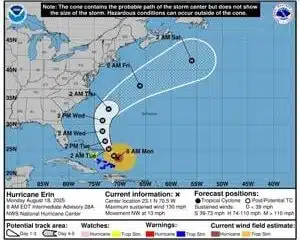News from the South - Alabama News Feed
Minnesota assassination prompts many lawmakers to wonder: Is service worth the danger?
by Alex Brown and Robbie Sequeira, Alabama Reflector
June 22, 2025
A year into her first term in office, New Jersey Assemblywoman Sadaf Jaffer decided not to run for reelection.
The political world saw her as a rising star in 2023; Jaffer, a Democrat, previously served as the nation’s first female Muslim mayor. But rampant harassment from online commenters and other politicians about her religion, as well as high-profile acts of violence against other public officials, made her reconsider her political future.
“I was concerned about my family,” Jaffer said in an interview. “They didn’t sign up for this. I didn’t want to put them in harm’s way.”
In the wake of the assassination of Minnesota state Rep. Melissa Hortman and her husband, as well as the wounding of state Sen. John Hoffman and his wife, more public officials across the country are taking stock of their safety. Some say death threats have become part of the job. They fear that violence — real attacks and constant threats — will scare potential candidates away from seeking public office.
Michigan Democratic state Rep. Laurie Pohutsky said she has faced multiple death threats since 2020. In one instance, a neighbor reported that a stranger was waiting at her house, demanding to know when she would return home.
“I have certainly considered somewhat frequently that I might be killed doing this job,” Pohutsky told Stateline. “But what really alarmed me [about the Minnesota attacks] and stopped me in my tracks was I had not considered that someone might enter my home and kill my family.”
Nationwide, lawmakers in both parties say political rhetoric that dehumanizes anyone who disagrees on an issue has created a charged atmosphere. As politicians increasingly describe their rivals not just as wrong on policy but as the enemy, the message can embolden extremists to carry out violence.
“People treat death threats against government officials as a matter of course until someone is assassinated,” Pohutsky said. “It’s an impossible position, because the people who are carrying out these attacks want people to leave public office.”
In some states, lawmakers are discussing whether officials’ home addresses should be included in campaign finance forms and other publicly available documents. Elsewhere, political leaders are reviewing their security protocols.
People treat death threats against government officials as a matter of course until someone is assassinated. It’s an impossible position, because the people who are carrying out these attacks want people to leave public office.
– Michigan Democratic state Rep. Laurie Pohutsky
But elected leaders say there are no easy answers. And they fear things will get worse before they get better.
“These threats of violence, we’ve seen it before here and there, but nothing like we’ve seen it now,” said South Carolina Republican Gov. Henry McMaster, speaking with reporters this week. “And yes, I think that would make a lot of people stop and think and decide they do not want to enter that arena.
“It’s a tough arena anyway,” McMaster said, “but when you have the threat of violence — unanticipated, unmitigated, unexpected violence — that’s just one more reason not to get involved in politics.”
Growing threats
In recent years, elected officials have faced a growing number of threats and attacks.
In 2020, a group of men were accused of plotting to kidnap Michigan Democratic Gov. Gretchen Whitmer; five were later convicted. That same year, the 20-year-old son of a federal judge in New Jersey was killed by a gunman and lawyer who had previously had a case before her.
Paul Pelosi, the husband of former U.S. House Speaker Nancy Pelosi, was assaulted by a hammer-wielding attacker at his home in 2022. President Donald Trump was targeted in a pair of assassination attempts during the 2024 campaign, including a shooting in which a bullet grazed his ear. And earlier this year, Pennsylvania Democratic Gov. Josh Shapiro was targeted in an arson attack on the governor’s mansion.
Nearly 9 in 10 state lawmakers reported facing demeaning or derogatory comments or actions in their current term or the campaign leading up to it, and more than 4 in 10 reported harassment and threats, according to a report published last year by the progressive-leaning Brennan Center for Justice.
Women were three to four times more likely than men to experience abuse related to their gender, according to the report. And people of color were more than three times as likely as white officeholders to endure race-based abuse.
Since the Jan. 6, 2021, attack on the U.S. Capitol, political threats against candidates — particularly women, people of color and LGBTQ+ individuals — have escalated dramatically, according to Amanda Litman, co-founder and president of Run for Something, a political action committee that helps recruit young, liberal candidates for office.
“It sucks that we have to have these conversations with folks,” she said. “But the goal of this violence is to stop good people from running.”
Litman said that her organization offers support for candidates, including safety protocols, digital privacy training and mental health support. But increasing political violence and the easy online access to officeholders and candidates has begun to change how they interact with constituents and what they share about their lives.
“We have candidates who may have not thought twice to share a photo of their family or post updates about their lives outside of political office,” Litman said. “But now there is a shift in being more deliberate about what is being shared, especially online, where people can send threats and other stuff into your DMs, and use that information to stoke even more fear.”
Language matters
Leaders say that rhetoric characterizing opponents as evil has made violent incidents more likely.
“People have gotten very, very good at toeing the line just shy of actually threatening to kill people,” Pohutsky, the Michigan lawmaker, said.
“That’s sort of become normalized,” she said. “If you make this a righteous fight, if you convince people that someone is harming children, it’s much easier to incite violence against them. That language is intentional.”
The changes have accelerated in recent years. Returning home in 2015 after serving in combat zones as a U.S. Marine and working in post-conflict regions, Jake Harriman said he didn’t recognize the country he had fought for.
Harriman said the tactics he witnessed extremist groups use in conflict areas abroad to exploit fractured nations and warring factions — such as division, fear, isolation — he now sees playing out across the United States.
“What shocked me most,” said Harriman, founder of More Perfect Union, a veteran-led civic service group, “was the hatred — Americans dehumanizing each other in ways I had only seen in war.”
More people are finding a sense of self and belonging via partisan political groups, such as identifying as MAGA or as an opponent of MAGA, said Amy Pason, an associate professor who specializes in political rhetoric at the University of Nevada, Reno.
“This is because people are more isolated or finding social groups on social media — or the other media they consume — and they identity with that group,” she said. “This gets to be more problematic when belonging to that group is to also accept beliefs and shift your attitudes — that those not in your group are dangerous or out to harm your group.”
Despite condemnations of the Minnesota shootings from state lawmakers of both parties, some Republicans in Congress rushed to social media to falsely blame Democrats and liberals.
U.S. Sen. Tina Smith, a Democrat and friend of Hortman’s, confronted U.S. Sen. Mike Lee, a Republican, in person on Capitol Hill after he made inflammatory comments about the assassination on the platform X. The posts were removed soon after.
Oregon state Sen. Jeff Golden, a Democrat, said the Minnesota attacks were a wakeup call. He pledged to direct his public comments in the future “towards the substance of the proposal and not the character of the person proposing.”
“I do think it can be a thin line,” Golden said. “I probably have crossed it one time or another, and I’m gonna do everything I possibly can not to do it again.”
But politicians have incentive to keep their base motivated and engaged through inflammatory attacks on people they characterize as the enemy, which dehumanizes them and fuels political violence, said Donald Nieman, a history professor at Binghamton University in New York.
Nieman noted in an email to Stateline that fear for personal and family safety is increasingly common among elected officials — affecting even how they vote. While he believes the path out is clear — “tone down the rhetoric, emphasize common ground” — he’s not optimistic.
“In a polarized political system, politicians depend on (and fear) a loyal base,” Neiman wrote. “I fear that the discussion of political violence will take the same course as school shootings: We will lament them, propose solutions that go nowhere, and there will be more shootings.”
Security measures
Just hours before the Minnesota shootings, Oregon lawmakers passed a bill that would make it harder for the public to obtain the home addresses of elected officials. Rather than having that information on the secretary of state’s website, as is currently law, the bill would require residents to submit a public records request to obtain those details.
In 2023, New Jersey lawmakers passed a bill exempting local officials from sharing their addresses publicly, but Democratic Gov. Phil Murphy declined to sign the measure, citing a technicality with its effective date.
“We’re in such uncharted territory when all of this data can be accessed by anyone and made into lists,” said Jaffer, the former New Jersey lawmaker, citing the “hit list” of 45 officials that law enforcement officials say had been compiled by alleged Minnesota attacker Vance Boelter.
“There needs to be more done to protect those who step up to serve, but we also need to protect freedom of speech and freedom of information,” she said.
Jaffer said a friend from another country was surprised to learn that she had no security detail while in office.
“We’re just normal people,” she said of state legislators. “It’s a great thing that we’re accessible, but it certainly makes us vulnerable.”
Following the Minnesota shootings, North Dakota officials announced they will take down lawmakers’ addresses from legislative websites. New Hampshire legislative leaders also pulled down pages with information about elected leaders, while ramping up security at the State House. Meanwhile, lawmakers in New Mexico are reviewing their security practices.
Litman, of Run for Something, said legislatures should consider funding security for local candidates and officials who may not be able to afford it.
“I think there’s a real fear that if Donald Trump, who has the best security detail in the world, can be attacked at a public event, then what about local officials who don’t have the budget to afford to keep themselves or their families safe?” Litman said.
Julia Shumway of the Oregon Capital Chronicle and Seanna Adcox of the South Carolina Daily Gazette contributed to this report.
Stateline reporters Alex Brown and Robbie Sequeira can be reached at abrown@stateline.org and rsequeira@stateline.org.
Independent Journalism for All
As a nonprofit newsroom, our articles are free for everyone to access. Readers like you make that possible. Can you help sustain our watchdog reporting today?
Alabama Reflector is part of States Newsroom, a nonprofit news network supported by grants and a coalition of donors as a 501c(3) public charity. Alabama Reflector maintains editorial independence. Contact Editor Brian Lyman for questions: info@alabamareflector.com.
The post Minnesota assassination prompts many lawmakers to wonder: Is service worth the danger? appeared first on alabamareflector.com
Note: The following A.I. based commentary is not part of the original article, reproduced above, but is offered in the hopes that it will promote greater media literacy and critical thinking, by making any potential bias more visible to the reader –Staff Editor.
Political Bias Rating: Center-Left
The article primarily highlights the rising threats and violence faced by public officials, focusing on the experiences of Democratic lawmakers and progressive organizations while also including perspectives from Republicans and bipartisan concerns. It emphasizes the dangers of polarized rhetoric and political violence, framing these as serious, systemic issues affecting elected officials across the spectrum. The inclusion of data from the Brennan Center for Justice, known for its progressive stance, and the focus on harassment of women, people of color, and Democrats suggest a slight left-leaning perspective. However, balanced quotes from Republican officials and calls for mutual civility moderate the overall tone, placing the article in the center-left range.
News from the South - Alabama News Feed
Final steel girders placed on new Gulf Shores bridge, completion on track
SUMMARY: The Alabama Department of Transportation (ALDOT) recently completed setting the final steel girders for the new Intracoastal Waterway Bridge in Gulf Shores, marking a major milestone in the $52 million project slated to open by summer 2026. The bridge will add two lanes in each direction alongside the existing Beach Express Bridge, increasing total lanes from seven to ten and easing congestion. With the steel and substructure complete, work now focuses on the concrete deck and approaches. This new span, along with the $30 million SR-161 connector and plans to widen SR-180, aims to enhance traffic flow, emergency access, evacuation routes, and local economic growth.
The post Final steel girders placed on new Gulf Shores bridge, completion on track appeared first on www.alreporter.com
News from the South - Alabama News Feed
A Minute with Drexel: Being an influencer for good
SUMMARY: In this segment, Drexel Gilbert reflects on the role of social media influencers, often promoting products or destinations. Instead of following the typical influencer path, Drexel suggests a new kind of influence—one focused on positive actions and character. Drawing on the definition of an influencer as someone who inspires others, and referencing 1 Timothy 4:12, she encourages being examples of honesty, generosity, encouragement, and kindness. Drexel urges everyone to become influencers for good by embodying positive traits and making a difference in others’ lives. She hopes her message inspires viewers to spread goodwill every day.
Ways to influence people to be better and do better
News from the South - Alabama News Feed
ALL ABOARD: Amtrak returns to Mobile after 20 years
SUMMARY: Amtrak returned to Mobile, Alabama, after 20 years with its Mardi Gras Service from New Orleans, sparking a festive celebration on Water Street. Amtrak President Rodger Harris highlighted the decade-long effort to restore passenger rail on the Gulf Coast, praising the enthusiastic community response. The train offers Coach and Business class seats, traveling about 79 mph with four stops in Mississippi, completing the trip in roughly four hours. Tickets start at $15 one way. Congressman Shamori Figures expressed hopes for service expansion and federal support to ensure its success. Commercial passenger service begins Monday, reconnecting communities along the Gulf Coast.
A homecoming 20 years in the making, as city and state leaders gathered in downtown Mobile Saturday to welcome Amtrak’s special arrival.
-
News from the South - Tennessee News Feed3 days ago
GRAPHIC VIDEO WARNING: Man shot several times at point-blank range outside Memphis convenience store
-
News from the South - Texas News Feed3 days ago
Kratom poisoning calls climb in Texas
-
News from the South - Kentucky News Feed3 days ago
Unsealed warrant reveals IRS claims of millions in unreported sales at Central Kentucky restaurants
-
Local News7 days ago
Bay St. Louis artist commemorates Amtrak’s return with hundreds of handmade medallions
-
News from the South - Arkansas News Feed5 days ago
Idaho is losing OB-GYNs. Doctors who remain are trying to shoulder the extra burdens.
-
News from the South - Georgia News Feed7 days ago
RCSS: Students showed growth on Georgia Milestones Assessments for 2024-2025
-
Our Mississippi Home5 days ago
Pride of Mississippi Marching Band to Kick Off Season with Free Concert
-
News from the South - Florida News Feed6 days ago
Summer heat, storms continue to swamp Central Florida. Here’s what to expect











































